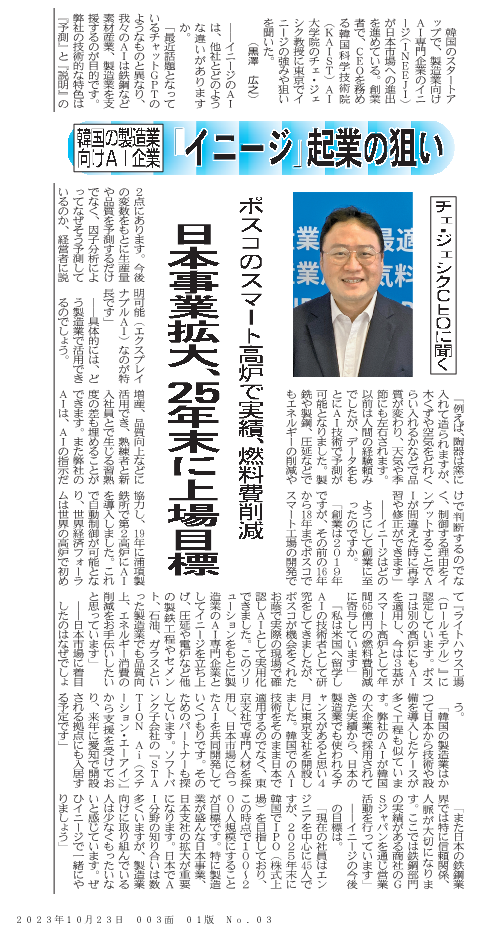
Goal of founding “INEEJI,” an AI company for Korea’s manufacturing industry
-Performance and fuel cost savings from POSCO’s smart blast furnace-
Expanding business in Japan, targeting listing by the end of 2025
“INEEJI,” a Korean startup manufacturing AI company, is seeking to enter the Japanese market.
We asked Professor Jaesik Choi of the Korea Advanced Institute of Science and Technology (KAIST) AI Graduate School, founder and CEO, about Ineasy's strengths and goals in Tokyo. (Reporter Kurosawa)
What is different about INEEJI's AI from other companies?
“Unlike Chat GPT, which has become a hot topic recently, our AI is aimed at supporting the steel and other material industries and manufacturing industries. Our technical specialties are “Prediction” and “Explanation”. It is characterized by not only predicting production or quality based on variables that arise in the process, but also being able to explain to managers why such predictions were made through factor analysis (eXplainable AI). "
Specifically, how can it be utilized in manufacturing?
“For example, pottery is made in a kiln, but its quality changes depending on how much wood waste or air is put into it, and it also depends on the weather and season.” In the past, we relied on human experience/senses, but now predictions are possible with data-based AI technology. It can be used to reduce energy, increase production, and improve quality in iron-making, steel-making, and rolling processes, and can also eliminate differences in familiarity between experienced and new employees. In addition, our AI is able to relearn or correct when the AI goes wrong by inputting the reason for control rather than judging only by AI instructions.”
How did INEEJI start up?
“We started our business in 2019, but before that, we cooperated with POSCO in developing smart factories from 2016 to 2018, and introduced AI to the second blast furnace at Pohang Steel Works in 2019. This enabled automatic control, making it the first blast furnace in the world to be recognized as a 'Lighthouse Factory' by the World Economic Forum. POSCO is also applying AI to other blast furnaces, and is currently contributing to reducing annual fuel costs by 6.5 billion yen with its 3G smart blast furnace. I studied abroad in the United States and conducted research as an AI engineer, but thanks to POSCO giving me the opportunity, I was able to check it out in the field and put it into practical use as AI. Based on this solution, we established INEEJI as a company specializing in AI in the manufacturing industry, and hope to help improve quality and reduce energy consumption in other steelmaking processes such as rolling and electric arc furnaces, and in manufacturing industries such as cement, oil, and glass.
Why did you focus on the Japanese market?
“Korea’s manufacturing industry often imported technology and equipment from Japan, so the processes are similar. Based on the track record of INEEJI's AI being applied in large Korean companies, we thought there was an opportunity to apply it to the Japanese manufacturing industry, so we established a Tokyo branch in April. Rather than simply applying AI technology from Korea to Japan, we plan to hire professional talent from our Tokyo branch and jointly develop AI tailored to the Japanese market. We are receiving support from Softbank subsidiary “STATION AI” and are planning to move into an office opening in Aichi Prefecture next year. Also, trust relationships and personal connections are especially important in the Japanese steel industry. That is why we are conducting sales activities in Japan through GS Japan, a trading company with a track record in the steel sector.”
INEEJI What are your future goals?
“Currently, we have 45 employees, mainly engineers, but we are aiming for an IPO (stock listing) in Korea at the end of 2025, and our goal is to have 100 to 200 employees at that point. In particular, expansion of Japanese business and Japanese branches becomes important, as the manufacturing industry is thriving. There are many people in the AI field in Japan, but it is unfortunate that so few people are developing it for manufacturing. Let’s work together at INEEJI.”







